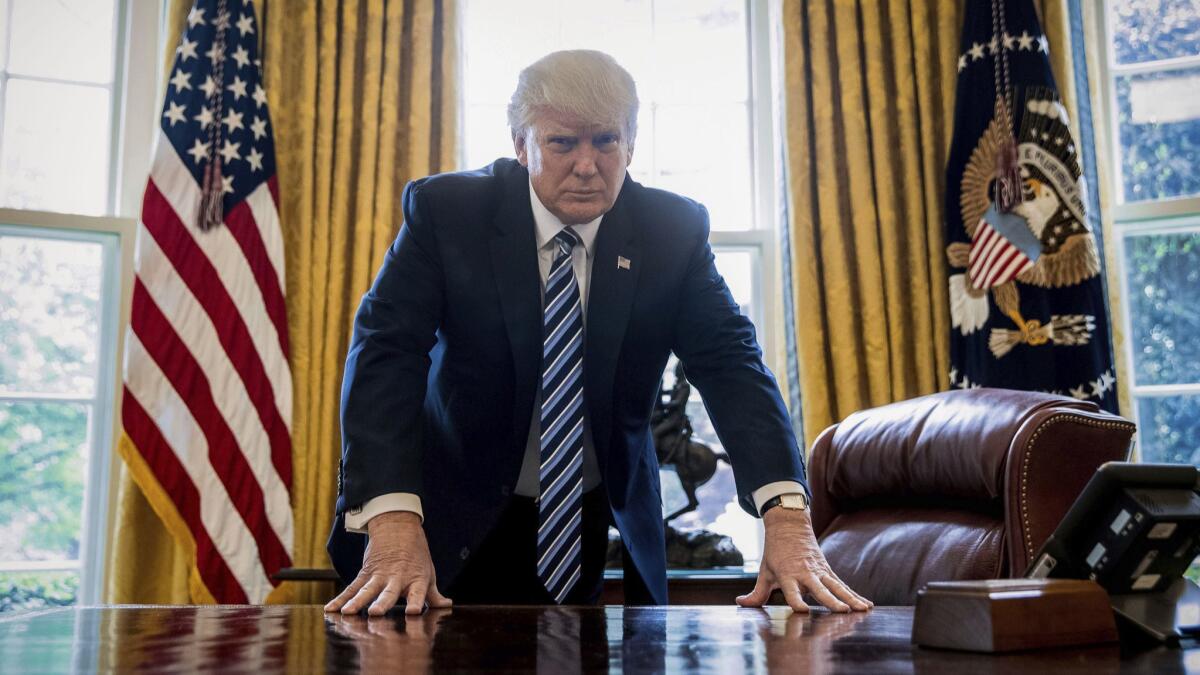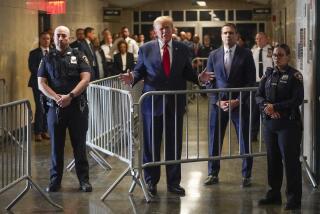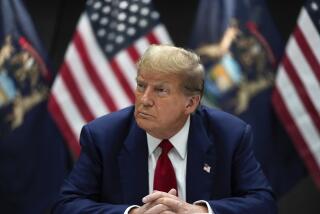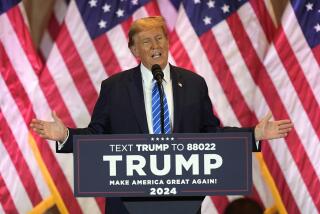Op-Ed: Congress won’t act, but there are other ways to make presidential candidates disclose their taxes

Since 2016, the Trump resistance has suggested a number of ways to keep another Donald J. Trump from winning a presidential election.
Former Secretary of Labor Robert Reich, for example, argues that Democrats should embrace stronger populist economic policies to inoculate the public against Trump’s appeal to unhappy working-class voters. Tennessee Democratic Rep. Steve Cohen takes another tack; he has introduced more than one bill that would eliminate the electoral college, thereby preventing another candidate from winning the election while losing the popular vote.
These aren’t bad ideas, but there’s a simpler and more certain way to reduce the likelihood of a future President Trump: Require candidates to disclose their taxes. Under such a rule, candidates like Trump — who, according to Michael Cohen, ran for president “to make his brand great, not to make this country great” — will be much less likely to enter the race.
Since Richard Nixon, all presidential candidates except Trump have disclosed their tax returns voluntarily. At first, the president claimed he would release his returns after an audit was completed. Now he says he will fight to keep the returns private even if they are subpoenaed by the Democratic House.
Forcing public disclosure of taxes for candidates is theoretically easy.
There are lots of things that make Trump a bad president. He appeals openly to racism and bigotry. He lies constantly. He hasn’t even attempted to learn his job. But the thing that is perhaps most Trumpian about Trump is the apparent corruption.
Most presidents put their assets in a blind trust when they assume office to prevent the appearance, or actuality, of self-dealing. Trump refused. After he was elected, Trump doubled the membership fee to $200,000 at his Florida Mar-a-Lago Club; wealthy people who join now know they’ll have unique access to the president. A recent lawsuit based on the Constitution’s emoluments clause alleges that the president is profiting illegally when foreign dignitaries, who may be trying to curry favor with the government, stay at his hotels. (Trump’s financial records have been subpoenaed in the case.)
Releasing Trump’s taxes would probably embarrass him, and it would clearly irritate him, but it might also threaten him. His latest returns could reveal conflicts of interest and whether he has taken advantage of them. We could discover that he evaded taxes; we’d see the limits of his charitable giving. Cohen told Congress Trump worries that he might end up being forced to pay penalties if his taxes are scrutinized. Worst of all from Trump’s perspective, we might find out he’s not a billionaire.
Forcing public disclosure of taxes for candidates is theoretically easy. Congress could pass a law requiring nominees for the presidency to make their tax returns public. Sen. Elizabeth Warren (D-Mass.) has introduced just such legislation as part of a suite of anti-corruption measures. It would require not only presidential candidates but congressional candidates as well to release years of back tax returns.
Warren’s bill will never get a vote in the Republican-controlled Senate, and this kind of puritan campaign reform may be hard to push through any Congress. But we don’t need to wait on Washington to act in order to require tax returns of presidential candidates.
State governments could try to force the issue by making the release of tax returns a prerequisite for candidates to participate in primary elections. New Jersey and California legislatures, among others, have considered such measures, though it’s unclear whether they could withstand court challenges. Opponents argue that states don’t have the ability to impose requirements on federal candidates.
Another option would be for the Democratic and Republican parties to take action. Parties have broad discretion in how to handle their nominating process. They already disallow candidates from primary debates who fall below certain polling thresholds, for example. There’s nothing to stop them from requiring candidates to release their tax returns if they want to participate in those face-offs.
Enter the Fray: First takes on the news of the minute »
Of course, it’s difficult to imagine Republicans requiring candidates to release tax returns anytime soon. The president’s popularity with GOP voters means party officials wouldn’t challenge Trump in this way. At some point, though, Republicans might well be looking for a way to take their nomination process back from people who are less interested in what they can do for their country than in what campaign exposure can do for their bottom line.
The GOP has been particularly beset by those who seem to get into presidential politics for reasons other than public service. Mike Huckabee, who ran for the Republican nomination in 2008 and 2016, has generated income from his celebrity — no doubt bolstered by his presidential bids — by maintaining an email list, and then selling the contact information of those who sign up for it. Ben Carson’s 2016 campaign spent an exorbitant amount of money on direct mail, which led some observers to suspect that Carson or others in the campaign might have had financial ties to the mailers.
Forcing candidates to release their taxes puts up a barrier for entry, especially for candidates with a history of tangled and quasi-legal business dealings. Anyone with shady financial endeavors would want to avoid the kind of scrutiny that could follow from disclosing tax documents.
By breaking the norm of disclosure, Trump has opened the door for grifters to run for president. We should close it again by making disclosure not just a norm, but also a requirement.
Noah Berlatsky is the author of “Corruption: American Political Films.”
Follow the Opinion section on Twitter @latimesopinionand Facebook
More to Read
A cure for the common opinion
Get thought-provoking perspectives with our weekly newsletter.
You may occasionally receive promotional content from the Los Angeles Times.






